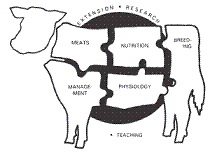Animal Science, Department of

Nebraska Beef Cattle Reports
Date of this Version
January 1996
Abstract
It has been estimated that as much as 25% of the protein fed to grazing and forage-fed animals is wasted due to its rapid degradation by the rumen microorganisms. Therefore. from an economic and environmental perspective, the nitrogen cycle of intensive livestock systems could be managed more effectively. Compounds such as ionophores can reduce ruminal ammonia production, but their anti-bacterial effects are too broad for its widespread use with grazing and forage-fed livestock. Another strategy to manipulate the activities of rumen bacteria responsible for protein degradation is the "smugglin concept". The "smugglin concept" involves the selective inhibition of microorganisms by the incorporation of inhibitory compounds into the normally transported peptides. We report here the effects of several synthetic peptides, as well as the polycationic peptide salmine, on the growth of Prevotella ruminicola, an important proteolytic rumen bacterium.


Comments
Published in 1996 Nebraska Beef Cattle Report; published by Agricultural Research Division, Institute of Agriculture and Natural Resources, University of Nebraska-Lincoln.